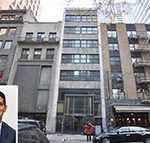New York state’s coronavirus foreclosure ban does not apply to mezzanine loans, a judge has ruled, putting to rest a question that has raised concern in the commercial lending world in recent weeks.
New York Supreme Court Judge Frank Nervo vacated a temporary restraining order that had prevented Henry Silverman’s 54 Madison Partners from holding a foreclosure auction for its equity interest in Hidrock Properties’ 161-key hotel project at 12 East 48th Street.
Mezzanine loan foreclosures are exempt from the statewide ban because they are not judicially-ordered, the judge ruled on Monday.
The judge also noted that Hidrock’s “anticipation of economic damage” caused by a sale in the midst of the Covid-19 pandemic “is merely speculative,” and monetary damages could be remedied after the fact if necessary.
Read more


In its lawsuit filed at the end of April, Hidrock claimed that 54 Madison’s planned May 1 foreclosure auction was an “improper and shameless attempt to capitalize on the Covid-19 pandemic” and become the sole bidder on the collateral, by requiring potential buyers to “risk their own well-being and flout the legal restrictions” to attend an in-person meeting at the MetLife building.
For its part, the lender dismissed the suit as “a shameless attempt to use the global pandemic” to deflect attention from the fact that Hidrock had “mismanaged this project for years.” The hotel was originally supposed to be completed last May, according to 54 Madison, and has suffered delays and cost overruns which the lender tried to accommodate, including by providing an additional $7 million junior mezzanine loan.
“This is particularly ironic and the perfect example of ‘no good deed goes unpunished,’” 54 Madison’s lawyers said in their response to the suit, adding that the auction — despite Hidrock’s claims to the contrary — was publicized properly and received interest from “at least ten reputable developers and financial institutions.”
Representatives for Hidrock and 54 Madison did not respond to requests for comment.
Governor Andrew Cuomo’s initial March 20 order stated that “There shall be no enforcement of either an eviction of any tenant residential or commercial, or a foreclosure of any residential or commercial property for a period of ninety days.” That led most of the lending community to believe that mezzanine loan foreclosures would be exempt, because they involve no judicial enforcement — but earlier decisions in the Hidrock lawsuit had put that in doubt.
An updated executive order on May 7 more specifically applies to “foreclosure of any residential or commercial mortgage.”
“I think the issue has really been put to rest, first by the wording of the new executive order, and now by this ruling,” Cleary Gottlieb partner Michael Weinberger said. A freeze on mezzanine foreclosures could have led to difficult issues between creditors, as junior lenders risked seeing their interests wiped out by modifications to more senior loans, he added.
In addition to the question of whether mezzanine foreclosures are banned by current executive orders, Judge Nervo’s decision also addressed another important question: whether a mezzanine foreclosure can be considered “commercially reasonable” under current circumstances. Mezzanine foreclosure auctions have traditionally been held in person at law offices, although the Uniform Commercial Code does allow them to be conducted online.
“Implicitly the judge was refuting the notion that any foreclosure would be inherently unreasonable,” Weinberger said. “This is a helpful decision for the lending community in that it says that you can have a commercially reasonable sale.”
“It doesn’t give instructions on exactly how to do that, but it does seem to strongly imply that the sorts of procedures prescribed by the lender here would be appropriate and reasonable,” he added.
